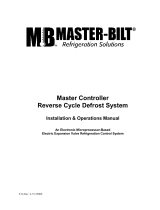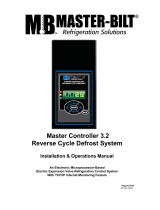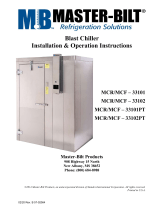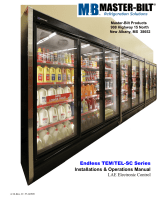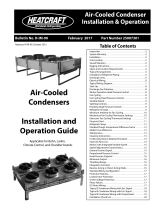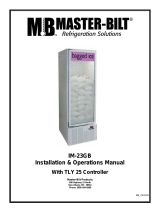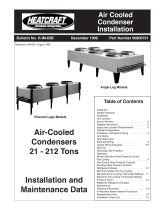Page is loading ...

5/16 Rev. A 57-02509
PARALLEL RACK SYSTEM
INSTALLATION & OPERATIONS MANUAL
With Master Rack Compressor Sequencer

2

3
Contents
INTRODUCTION .................................................................................................................................... 4
WARNING LABELS AND SAFETY INSTRUCTIONS ....................................................................... 5
PS SERIES PARALLEL RACK FEATURES ........................................................................................ 6
PARALLEL RACK NOMENCLATURE ............................................................................................... 7
PRE-INSTALLATION INSTRUCTIONS .............................................................................................. 8
I. GENERAL INFORMATION .......................................................................................................... 8
II. DELIVERY INSPECTION ............................................................................................................. 8
INSTALLATION INSTRUCTIONS ....................................................................................................... 8
I. HANDLING AND PLACEMENT OF PARALLEL RACK SYSTEM ......................................... 8
II. ELECTRICALSPECIFICATIONS ................................................................................................ 9
III. REFRIGERANT PIPING ............................................................................................................ 10
V. LEAK CHECK ............................................................................................................................ 11
VI. EVACUATION, DEHYDRATION, AND START-UP ............................................................ 11
CHARGING PROCEDURES ................................................................................................................ 12
I. PRELIMINARY ............................................................................................................................. 12
II. LOW AMBIENT CHARGING ..................................................................................................... 12
START UP ............................................................................................................................................. 14
GENERAL MAINTENANCE ............................................................................................................... 14
TROUBLESHOOTING ......................................................................................................................... 15
SALE AND DISPOSAL ........................................................................................................................ 16
LABOR WARRANTY .......................................................................................................................... 16
APPENDIX A ........................................................................................................................................ 17

4
INTRODUCTION
Thank you for purchasing Master-Bilt
®
refrigeration equipment. This manual contains important instructions for
installation, use and service. Read this entire manual carefully before installing or servicing your Master-Bilt
®
equipment.
NOTICE
Installation and service of the refrigeration and electrical components must be performed by a
refrigeration mechanic or licensed electrician.
DANGER
Equipment MUST be properly grounded.
Improper or faulty hook-up of electrical components of the refrigeration units can result in severe injury
or death. All electrical wiring hook-ups must be done in accordance with all applicable local, regional or
national standards.
NOTICE
Read this manual before installing your refrigeration equipment. Keep the manual and refer to it before
doing any service. Failure to do so could result in personal injury or equipment damage.
The portions of this manual covering refrigeration and electrical components contain technical instructions
intended only for persons qualified to perform refrigeration and electrical work.
This manual cannot cover every installation, use, or service situation. If you need additional information, call or
write us:
Parts and Technical Service Department
Master-Bilt Products
908 Highway 15 North
New Albany, MS 38652
Phone (800) 684-8988
Email: service@master-bilt.com

5
WARNING LABELS AND SAFETY INSTRUCTIONS
This is the safety-alert symbol. When you see this symbol, be alert to the potential for
personal injury or damage to your equipment.
Be sure you understand all safety messages and always follow recommended precautions and safe operating
practices.
NOTICE TO EMPLOYERS
You must make sure that everyone who installs, uses, or services your refrigeration equipment is
thoroughly familiar with all safety information and procedures.
Important safety information is presented in this section and throughout the manual. The following signal words
are used in the warnings and safety messages:
DANGER:
Severe injury or death WILL occur if you ignore the message.
WARNING:
Severe injury or death CAN occur if you ignore the message.
CAUTION:
Minor injury or damage to your refrigeration can occur if you ignore
the message.
NOTICE:
This is important installation, operation or service information. If you ignore the message, you may
damage your refrigeration.
The warning and safety labels shown throughout this manual are placed on your Master-Bilt
®
Products
refrigeration at the factory. Follow all warning label instructions. If any warning or safety labels become
lost or damaged, call your customer service department at (800) 684-8988 for replacements.
This Label is located on the condensing unit

6
PS SERIES PARALLEL RACK FEATURES
• Generously sized condenser for high efficiency in high ambient conditions.
• Hermetic, semi-hermetic, and Scroll compressors in any combination the customer chooses.
• Generously sized receivers with isolation valves and liquid level indicator.
• Compressor suction and discharge line service valves with access ports.
• Pre-wired and mounted high and low pressure controls with each compressor.
• Factory leak tested.
• U.L. listed.
• Access for serviceability.
• Pre-wired with single point electrical connection with main disconnect switch and main circuit breaker.
• Circuit breaker for each compressor.
• Crankcase heaters installed for outdoor units.
• Refrigeration lines pre-piped to edge of unit.
• Pre-piped and mounted refrigerant sight glass.
• Flooded head pressure controls standard on each system. Other options available.
• Galvanized steel housing is standard, Stainless steel housing available.
• Engineered refrigeration drawing available for specific projects, or with purchase order. (Contact factory for
additional details).
• KE2THERM compressor sequencer controls for maximum energy saving.
• Replaceable core suction and liquid filter driers.
• Oil return system complete with oil separator, oil level controls and oil filter are standard.
• Two suction groups can be controlled within a single frame/cabinet.
• Hot gas defrost, electric defrost, and off cycle defrost available.
• Heat reclaim available.
• Split condenser available.
• Floating head pressure control available
• EVI compressors with sub cooled liquid available.
• Standard alarms include phase loss and oil failure. Various alarms available including compressor failure, liquid
level, etc.

7
PARALLEL RACK NOMENCLATURE
PS E A C 5 2 V C
-
XXXXX
Quote Number
Voltage
A = 115/60/1
B = 208-230/60/1
C = 208-230/60/3
D = 460/60/1
E = 460/60/3
F = 200-220/50/3
G = 380-420/50/3
H = 208/60/1
J = 380/50/1
K = 200-220/50/1 or 220/50/1
L = 575/3/60
M = 200-230/60/3
R
=
265/60/1
T = 380/60/3
Refrigerant
Z = R404A; V =R407A; D = R448/R449A
# Suction Groups
1 to 3
# Compressors
2 to 10
Condenser Location
R = Remote
I = Integrated
C = Mounted on Common Frame
Condensing Method
A = Air Cooled
W = Water Cooled
Frame
I = Interior
E = Exterior
Rack
PS = Standard Rack
GPS = Glycol Rack

8
PRE-INSTALLATION INSTRUCTIONS
I. GENERAL INFORMATION
Please read this manual prior to installing your Master-Bilt
®
equipment. This information is based on good
refrigeration practice and should be used as a guide for installation and operation.
II.
DELIVERY INSPECTION
You are responsible for filling all freight claims with the delivering truck line. Inspect all cartons and crates for
damage as soon as they arrive. If damage is noted to shipping crates or cartons or a shortage is found, note this
on the bill of lading (all copies) prior to signing.
If damage is discovered when the cabinet arrives, immediately call the delivering truck line and follow up the call
with a written report indicating concealed damaged to your shipment. Ask for an immediate inspection of your
concealed item. Crating material MUST be retained (if applicable) to show the inspector representing the truck
line.
INSTALLATION INSTRUCTIONS
I.
HANDLING AND PLACEMENT OF PARALLEL RACK SYSTEM
There should be a minimum of 3 feet around the perimeter of the Rack System that should be
unobstructed. This allows for proper servicing of the equipment. Please refer to local and state codes as
well at the NEC for additional clearance requirements.
Holes are provided in the base supports for mounting bolts and for bridle lift rods.
For indoor mounting, motor rooms should be provided with fans designed to move 100 CFM of air per one ton of
refrigeration capacity.

9
II. ELECTRICALSPECIFICATIONS
Electrical power supply must match the rack power
requirements indicated on the unit data plate. A
WIRING DIAGRAM IS LOCATED ON THE INSIDE
ON THE ELECTRICAL BOX COVER. For best
results, it is suggested that power supply for PS
Rack systems be applied as illustrated below in
Figure 1. All field wiring should be done in a
professional manner, in accordance with all
governing codes. All wiring (including factory
terminals) should be double checked before start-up
Wiring diagrams specific to each installation will be
provided by Master-Bilt.
Figure 1: Suggested Field Wiring Location for PS Units.
NOTICE!
Systems with scroll compressors must be checked for proper power phasing. Improper power phasing will result
in improper compressor rotation causing compressor to pump incorrectly. A phase monitor is standard on PS
systems for this purpose.
Three phase scroll compressors are directional dependent, i.e., they will only compress in one rotational direction
and will rotate in either direction depending on power phasing. Verification of proper rotational direction is made
by observing that suction pressure drops and discharge pressure rises when the compressor is energized.
Reverse rotation also results in an elevated
sound level over correct rotation, as well as substantially reduced
current draw compared to data tag values.
NOTICE!
Check phase alignment on all incoming power.

10
III.
REFRIGERANT PIPING
Use only refrigeration grade copper tubing, (ACR), type “L”, bright annealed, dehydrated, and properly sealed
against contamination. Soft temper tubing may not be used for field interconnection of refrigeration components.
Take extreme care to keep refrigeration tubing clean and dry prior to installation. Use an appropriate size tube
cutter. Remove any burring that may occur when cutting the tubing. Use dry nitrogen to purge the system of any
foreign objects that may have come about during any pipe cutting.
All suction lines will be insulated with not less than
¾”
Armaflex or acceptable substitute as determined by
Master-Bilt personnel. Armaflex insulation must be properly glued or taped as approved by insulation
manufacturer to prevent refrigeration lines from “sweating”.
Appropriate oil must be added to systems per Compressor manufacturer specifications.
Suction lines should be sloped down
½”
for each 10 feet of horizontal run towards the compressor. This will
facilitate good oil return to the compressor.
Refrigeration lines will be sized appropriately to facilitate proper oil return to the compressor and reduce
refrigerant line pressure drop. Table 1 depicts proper line sizing options. Use this as a guideline for your selection.
Any fittings used may be accounted for in the Table to the right.
TABLE 1: EQUIVALENT FEET
Fitting
Tee
Tee
Size
90º Ell
45º Ell
(Line)
(Branch)
1/2" 0.9 0.4 0.8 2
5/8" 1 0.5 1 2.5
7/8" 1.5 0.7 1.5 3.5
1-1/8" 1.8 0.9 1.5 4.5
1-3/8" 2.4 1.2 1.8 6
1-5/8" 2.8 1.4 2 7
2-1/8" 3.9 1.8 3.8 10

11
All vertical risers will have an appropriate “P” trap at the beginning of the riser and every 20 ft above this point. If
the total rise is less distance than can be evenly divided by 20, the P-traps will be located at the beginning and in
the center of the distance so that the total distance between any two traps does not exceed 20 ft.
Keep the refrigeration lines as short as possible and use as few fittings as practicable, being especially careful
not to “kink” the lines. Keep the layout as simple as possible and properly support the piping to absorb vibration
and the normal expansion and contraction caused by temperature changes.
Add appropriate amount of oil per compressor manufacturer recommendations to compensate for oil return
system volume.
When brazing, dry nitrogen MUST be passed through the lines at low pressure to prevent scaling and oxidation
inside the tubing and fittings. All flux will be removed from the joints when brazing is complete.
MINIMIZE the amount of flux used to prevent internal contamination of the refrigeration system.
Silver brazing wire is to be utilized (high temperature alloy of minimum of 5% silver content on all copper
connections, and high temperature alloy of 45% silver content on all dissimilar metal connections.
The refrigeration contractor will be responsible for providing and installing the liquid line solenoid valve and coil
and evaporator pressure regulator for all loop piping systems unless otherwise requested by the customer.
Consult the refrigeration schedule for details.
V.
LEAK CHECK
When all refrigeration line connections have been made, the complete system, including factory connections,
should be checked.
Add the proper refrigerant to 60 psig, and then boost the 150 psig with dry nitrogen. Leak checks should be done
on all joints with an electronic leak detector or halide torch. If leaks are found, relieve the pressure and make
repairs as necessary and recheck.
Verify that all valves have been re-opened and re-pressurize the system to
150 psig as before for at least 12 hours. System pressure should not change during this time. Pressurizing the
system above 150 psig may damage the suction pressure transducers. Do not apply pressure above 150 psig to
these transducers.
VI. EVACUATION, DEHYDRATION, AND START-UP
A vacuum of 500 microns or less must be pulled to properly dehydrate the refrigeration system.
Do not use the system compressor as a vacuum pump.
Do not operate compressor while system is in a vacuum.

12
CHARGING PROCEDURES
I. PRELIMINARY
With the system in a vacuum, liquid charge the system by adding refrigerant into the liquid side of the system at
a service valve provided. Add as much refrigerant as the system will take up to the holding capacity of the
receiver.
II. LOW AMBIENT CHARGING
All standard air cooled condensers on the PS Rack System are equipped with a head pressure control valve to
maintain proper head pressure during winter conditions. These valves function by reducing the effective
condenser area by flooding or “backing up” refrigerant in the condenser to reduce the amount of surface
available for condensing. To operate properly, more charge is required during this flooding condition.
To find the recommended low ambient charge add the recommended pre-charge to the additional refrigerant
required for line set length (Table 3) then multiply the pounds of refrigerant by the percent flooding required in
Chart A to arrive at the additional charge required.
Typical Head Pressure Control Valve

13
Chart A:

14
START UP
For startup procedures please refer to the Parallel Startup Guide included with your rack system.
Rack electrical and piping schematics are included in the main control panel of the rack system.
GENERAL MAINTENANCE
Periodic inspection and upkeep is required to ensure reliable operation of the parallel rack system. Due to
variability in systems and end user applications Master-Bilt provides only recommended maintenance items.
This is not an all-inclusive list.
All refrigeration maintenance must be performed by a qualified refrigeration technician.
The information provided is intended as a minimum guide to maintenance. A detailed maintenance plan should
be provided by a qualified refrigeration maintenance company. Service Intervals may vary based on site specific
operating conditions.
WEEKLY MONTHLY QUARTERLY SEMI-ANNUAL ANNUALLY
Check Suction
Pressure
Check Filter and Drier
Cores
Check Sub-cooling Check and Tighten
Compressor
Mounts
Clean Condenser Coil
Check Discharge
Pressure
Check Electrical
Wiring
Check Superheat Check and Tighten
Line Connections
Check or Replace Fan
Blades
Check Refrigerant
Charge
Check Electrical Boxes Check Pressure
Controls
Check and Tighten
Electrical
Connections
Change Filter-Drier
Check Oil Levels Check Fan Motors Check Compressor
Amperage
Change Suction Filters
Check Contactors
Check Compressor
Mounts
Check Oil Quality

15
TROUBLESHOOTING
PROBLEM CAUSE
Compressor hums without starting
Incorrect wiring
Low voltage
Locked compressor rotor
Mechanical compressor damage
Compressor will not start
Tripped breaker
Wire disconnected/ broken
Fuse blown
Compressor starts and trips breaker
Short in wiring
High discharge pressure
Mechanical compressor damage
Breaker damaged
Shorted motor windings
Short cycling
Pressure control not set properly
Low refrigerant
High discharge pressure
High head pressure
Dirty condenser
Overcharged system
Condenser fan failure
Discharge line restriction
Low head pressure
Low ambient conditions
Low refrigerant
Improper head pressure valve setting
Cooler/ Freezer temperature too high
Non-working fan
Dirty evaporator coil
Frozen evaporator coil
Low refrigerant
Clogged expansion valve
Improper adjustment on expansion valve
Low oil pressure
Oil trapped in system
Insufficient oil charge
Liquid refrigerant returning to compressor
Dirty/ clogged oil filter
Dirty/ clogged oil separator filter

16
SALE AND DISPOSAL
If you sell or give away your refrigeration equipment system or components you must make sure that all safety
labels and I&O Manuals are included. If you need replacement labels or manuals, contact the parts and technical
service department at Master-Bilt at (800) 684-8988
The customer service department at Master-Bilt should be contacted at the time of sale or disposal of your
equipment so records may be kept of its new location.
If you sell or give away your Master-Bilt
®
cabinet and you evacuate the refrigerant charge before
shipping, you must evacuate the refrigerant into an approved recovery and reclaim system in order to satisfy all
applicable federal and state regulations regarding release of refrigerant compounds into the atmosphere.
The release of refrigerant compounds into the atmosphere is a source of ozone depletion and regulated
by state and federal laws.
LABOR WARRANTY
A. A 90-day labor warranty will be provided on all installer provided labor and installation.
B. A 1 year optional Labor warranty will be quoted separate from the installation.
C. Master-Bilt will provide a one year parts warranty on all parts that fail under normal operation conditions.

17
APPENDIX A
TYPICAL PS SERIES PIPING SCHEMATIC

18

19
COOLER EVAPORATOR WIRING
FIRST UNIT COOLER PER ROOM SECOND UNIT
COOLER when use

20
FREEZER EVAPORATOR WIRING
/





